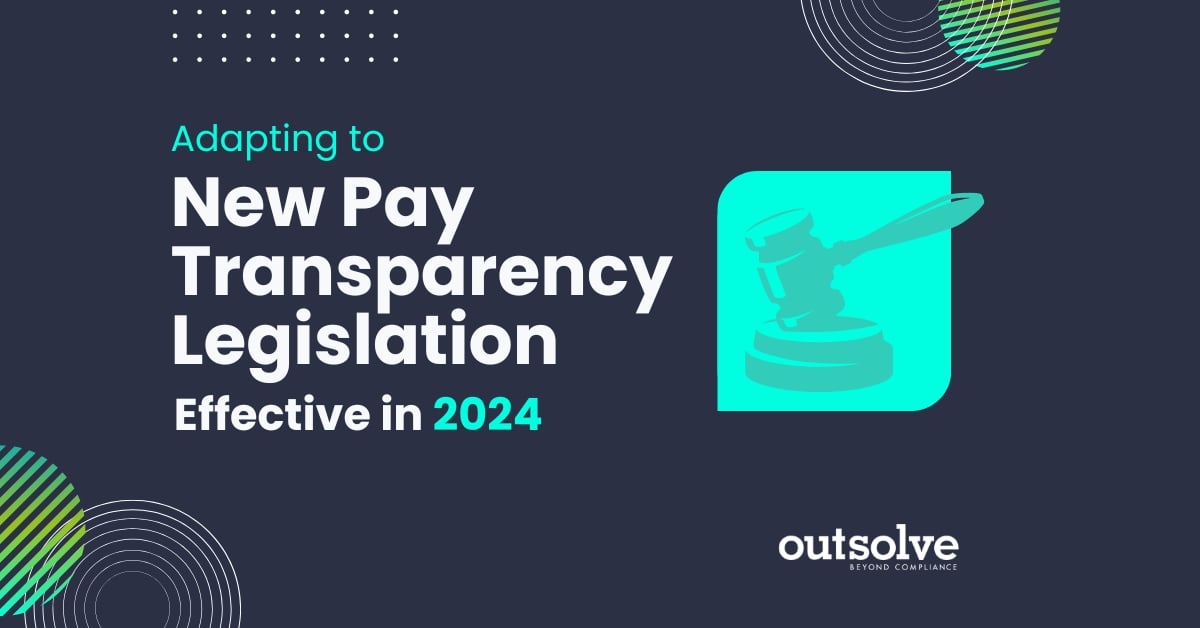 The Power of Pay Transparency: A Win-Win for Employers and Candidates
Imagine stumbling upon your current job being advertised online with a juicier paycheck than yours. That's exactly what happened to one woman in New...
Desiree Throckmorton, SPHR
Jul 17, 2024 11:45:00 AM
The Power of Pay Transparency: A Win-Win for Employers and Candidates
Imagine stumbling upon your current job being advertised online with a juicier paycheck than yours. That's exactly what happened to one woman in New...
Desiree Throckmorton, SPHR
Jul 17, 2024 11:45:00 AM
Imagine stumbling upon your current job being advertised online with a juicier paycheck than yours. That's exactly what happened to one woman in New York City last year. She saw a role very similar to hers on LinkedIn, but with a higher salary, and thought, "Why not apply?"
Desiree Throckmorton, SPHR The Power of Pay Transparency: A Win-Win for Employers and Candidates Navigating Pay Transparency Laws: A Comprehensive Guide for Employers
Pay transparency laws continue to gain traction in the United States as a measure to address the persistent gender pay gap and promote fair...
Neil Dickinson
Jun 24, 2024 10:45:00 AM
Navigating Pay Transparency Laws: A Comprehensive Guide for Employers
Pay transparency laws continue to gain traction in the United States as a measure to address the persistent gender pay gap and promote fair...
Neil Dickinson
Jun 24, 2024 10:45:00 AM
Pay transparency laws continue to gain traction in the United States as a measure to address the persistent gender pay gap and promote fair compensation. By shedding light on compensation practices, pay transparency empowers employees to make informed career decisions and encourages employers to conduct fair and equitable pay practices. Many employers are also adopting the principles of pay transparency for strategic reasons, as a way to strengthen and differentiate their talent practices.
Neil Dickinson Navigating Pay Transparency Laws: A Comprehensive Guide for Employers Preparing for Vermont's Pay Transparency Law
On July 1, 2025, a new regulation mandating pay transparency in job advertisements will come into effect in Vermont. Signed into law by Governor...
Debra Milstein Gardner
Jun 20, 2024 3:18:42 PM
Preparing for Vermont's Pay Transparency Law
On July 1, 2025, a new regulation mandating pay transparency in job advertisements will come into effect in Vermont. Signed into law by Governor...
Debra Milstein Gardner
Jun 20, 2024 3:18:42 PM
On July 1, 2025, a new regulation mandating pay transparency in job advertisements will come into effect in Vermont. Signed into law by Governor Phil Scott on June 4, 2024, H.704 requires employers with at least five employees to disclose the compensation or range of compensation for any advertised position.
.png?width=1200&height=628&name=V1-R1%20cpittman@outsolve.com%20%20-Employers%20Guide%20to%20New%20Pay%20Transparency%20Regulations%20in%20Minnesota%20and%20MD_1200%20x%20628_MF_05%20June%202024%20(1).png) Employer's Guide to New Pay Transparency Regulations in Minnesota and Maryland
Starting in late 2024 and early 2025, Minnesota and Maryland will implement new pay transparency laws requiring employers to include detailed...
Debra Milstein Gardner
Jun 7, 2024 10:45:00 AM
Employer's Guide to New Pay Transparency Regulations in Minnesota and Maryland
Starting in late 2024 and early 2025, Minnesota and Maryland will implement new pay transparency laws requiring employers to include detailed...
Debra Milstein Gardner
Jun 7, 2024 10:45:00 AM
Starting in late 2024 and early 2025, Minnesota and Maryland will implement new pay transparency laws requiring employers to include detailed compensation information in job postings. These laws are part of a growing trend aimed at promoting wage transparency and preventing wage discrimination. Here's a breakdown of what employers in these states need to know to ensure compliance.
Debra Milstein Gardner Employer's Guide to New Pay Transparency Regulations in Minnesota and Maryland Do You Know How Pay Transparency Impacts Your Organization? Learn How to Implement It Now
In recent years, pay transparency has gained traction as a strategy to address pay discrimination and promote a fairer workplace. Advocates argue...
Debra Milstein Gardner
Jun 4, 2024 1:25:00 PM
Do You Know How Pay Transparency Impacts Your Organization? Learn How to Implement It Now
In recent years, pay transparency has gained traction as a strategy to address pay discrimination and promote a fairer workplace. Advocates argue...
Debra Milstein Gardner
Jun 4, 2024 1:25:00 PM
In recent years, pay transparency has gained traction as a strategy to address pay discrimination and promote a fairer workplace. Advocates argue that making pay information openly accessible can highlight and rectify disparities, particularly gender-based pay gaps. However, while pay transparency can foster trust and improve organizational morale, it also carries potential downsides that organizations need to navigate carefully.
Debra Milstein Gardner Do You Know How Pay Transparency Impacts Your Organization? Learn How to Implement It Now EEOC Unveils Pay Insights: Impacts of EEO-1 Component 2 Dashboard on Businesses
The March release of the EEO-1 Component 2 dashboard by the Equal Employment Opportunity Commission (EEOC) has sparked a new wave of interest in U.S....
Neil Dickinson
Apr 18, 2024 10:55:03 AM
EEOC Unveils Pay Insights: Impacts of EEO-1 Component 2 Dashboard on Businesses
The March release of the EEO-1 Component 2 dashboard by the Equal Employment Opportunity Commission (EEOC) has sparked a new wave of interest in U.S....
Neil Dickinson
Apr 18, 2024 10:55:03 AM
The March release of the EEO-1 Component 2 dashboard by the Equal Employment Opportunity Commission (EEOC) has sparked a new wave of interest in U.S. pay gaps and potential concerns for businesses. This new data portal allows users to explore pay data from large employers across various industries, broken down by race, ethnicity, gender, and job category. The data from 2017 and 2018 EEO-1 collections offers unprecedented transparency into workforce demographics and compensation practices.
Neil Dickinson EEOC Unveils Pay Insights: Impacts of EEO-1 Component 2 Dashboard on Businesses Adapting to New Pay Transparency Legislation Effective in 2024
In the pursuit of fair and equitable compensation practices, jurisdictions worldwide are implementing new laws to promote pay transparency and combat...
Debra Milstein Gardner
Mar 20, 2024 1:15:00 PM
Adapting to New Pay Transparency Legislation Effective in 2024
In the pursuit of fair and equitable compensation practices, jurisdictions worldwide are implementing new laws to promote pay transparency and combat...
Debra Milstein Gardner
Mar 20, 2024 1:15:00 PM
In the pursuit of fair and equitable compensation practices, jurisdictions worldwide are implementing new laws to promote pay transparency and combat wage disparities. These legislative initiatives aim to address historical inequalities by prohibiting employers from inquiring about an applicant's salary history, disclosing salary ranges in job postings, and restricting the use of pay history in determining compensation. As we delve into the overview of three jurisdictions' upcoming pay transparency laws set to take effect in 2024, we'll examine the specifics of these regulations and their implications for employers and job seekers alike.
Debra Milstein Gardner Adapting to New Pay Transparency Legislation Effective in 2024-1.png?width=1200&height=628&name=future%20of%20work%20(2)-1.png) Proposed Federal Rule: Salary Disclosure and Compensation History Ban
President Biden's Executive Order 14069, issued on March 15, 2022, directed the Federal Acquisition Regulatory Council (FAR) to explore limiting or...
Debra Milstein Gardner
Feb 15, 2024 1:36:39 PM
Proposed Federal Rule: Salary Disclosure and Compensation History Ban
President Biden's Executive Order 14069, issued on March 15, 2022, directed the Federal Acquisition Regulatory Council (FAR) to explore limiting or...
Debra Milstein Gardner
Feb 15, 2024 1:36:39 PM
President Biden's Executive Order 14069, issued on March 15, 2022, directed the Federal Acquisition Regulatory Council (FAR) to explore limiting or prohibiting Federal contractors from considering job applicants' or employees' past compensation when making hiring decisions. To this end, on December 4, 2023, the FAR submitted a proposal titled "Pay Equity and Transparency in Federal Contracting" to the Office of Management and Budget (OMB) for approval. The proposal was approved by OMB on January 29, 2024, and the FAR released the Notice of Proposed Rulemaking (NPRM), which was published in the Federal Register on January 30, 2024.
Debra Milstein Gardner Proposed Federal Rule: Salary Disclosure and Compensation History Ban.jpg?width=1200&height=628&name=New%20Pay%20transparency%20(1).jpg) Anticipating the District of Columbia’s New Pay Transparency Requirements
The District of Columbia is becoming the next jurisdiction to address income disparities and gender inequities in the workplace. On December 19,...
Debra Milstein Gardner
Jan 25, 2024 10:45:00 AM
Anticipating the District of Columbia’s New Pay Transparency Requirements
The District of Columbia is becoming the next jurisdiction to address income disparities and gender inequities in the workplace. On December 19,...
Debra Milstein Gardner
Jan 25, 2024 10:45:00 AM
The District of Columbia is becoming the next jurisdiction to address income disparities and gender inequities in the workplace. On December 19, 2023, Bill 25-194, the Wage Transparency Omnibus Amendment Act of 2023, was passed to redefine how employers engage with prospective employees, emphasizing transparency in pay scales and benefits.
Debra Milstein Gardner Anticipating the District of Columbia’s New Pay Transparency Requirements.png?width=1200&height=628&name=Colorado%20DR%20(1).png) Decoding Colorado’s Equal Pay for Equal Work Act
The signing of SB-23-105 by Governor Jared Polis on June 5, 2023, marked a significant moment for Colorado's Equal Pay for Equal Work Act. These...
Debra Milstein Gardner
Jan 8, 2024 10:45:00 AM
Decoding Colorado’s Equal Pay for Equal Work Act
The signing of SB-23-105 by Governor Jared Polis on June 5, 2023, marked a significant moment for Colorado's Equal Pay for Equal Work Act. These...
Debra Milstein Gardner
Jan 8, 2024 10:45:00 AM
The signing of SB-23-105 by Governor Jared Polis on June 5, 2023, marked a significant moment for Colorado's Equal Pay for Equal Work Act. These amendments, effective January 1, 2024, are aimed at promoting greater pay transparency and fairness in the workplace. They not only extend the statute of limitations for wage discrimination claims but also introduce new mandates for the Colorado Department of Labor and Employment (CDLE) in handling these claims. On September 23, 2023, the CDLE released the proposed Equal Pay Transparency Rules (EPT Rules), which were officially adopted on November 9, 2023.
Debra Milstein Gardner Decoding Colorado’s Equal Pay for Equal Work ActNeed More Help? Contact OutSolve.
We offer HR compliance, anti-discrimination, and fair pay solutions.


.png)



